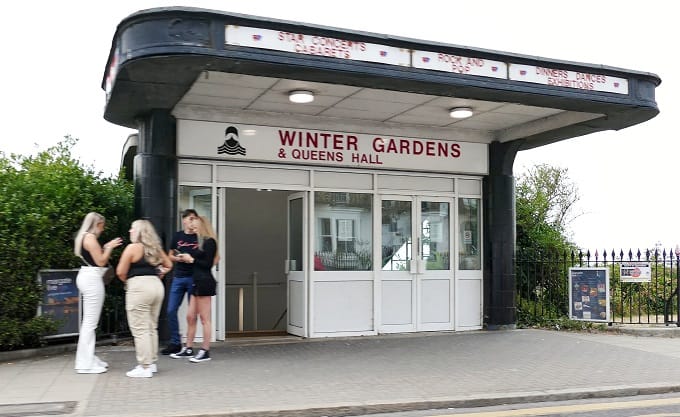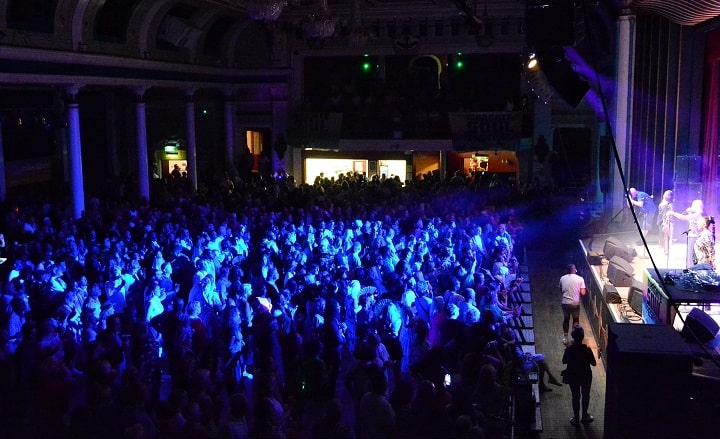
Tonight (August 7) crowds will enjoy live music at Margate Winter Gardens for the last time before the doors shut for the venue to undergo an “option appraisal.”
The venue, which is owned by Thanet council, was due to shut from August 14 but Margate Soul Festival is the last event booked in for performances at the historic building.
Thanet council plans to use Margate Town Deal funding of £300,000 to create a fully developed plan for the site. This would include a detailed project delivery plan with public and private sector engagement. Specialist services would be needed to help test the market and identify the opportunities available. Specialist architects would also be used to scope out the required works and develop a fully costed scheme.

Initially operator Your Leisure was to retain the lease which ran until 2024 but agreement was then made for an early surrender. Your Leisure’s annual rolling lease at Theatre Royal also ceased on 28 April. A refurbishment of that venue is planned under the £22.2million Town Deal fund but a date for this is yet to be announced.
In May Margate Central ward councillor Rob Yates, together with fellow members of Labour’s shadow cabinet at the council, called for a public meeting to hear what the future plans for the Winter Gardens were. Thanet council leader Ash Ashbee said the council was “committed to including significant amounts of public engagement as part of the appraisal.”

A demonstration calling for the meeting was also held outside Thanet council’s offices on July 14.
Some 200 people attended the gathering organised by Thanet resident Jack Packman. On that day Cllr Yates said the money allocated to Thanet council for the study had not been received and the procurement process to hire a consultant had not begun.
Those backing the demonstration included Olby’s, Margate Operatic Society, Thanet Virtual High Street, Silvers, Off The Hook productions, Ralph ‘Mr Ramsgate’ Hoult and business owner/photographer Frank Leppard.

Margate Winter Gardens has been open and supporting the Thanet community for 110 years, with the last time it was closed during World War II. The 2,000-capacity venue supports local jobs and has entertained hundreds of thousands over the years.
Margate Soul Festival reaches a climax today with a Sunset Stage headline performance from Emeli Sande and finale party live performances from The Brand New Heavies, Loose Ends, SouLutions and ‘Lovers Rock Queen’ Carroll Thompson.
Potted history of the Winter Gardens
The Pavilion and Winter Gardens took just nine months to build, costing £26,000, and opened on August 3, 1911.
When completed the Pavilion and Winter Gardens consisted of: a large Concert Hall, four entrance halls, two side wings and an amphitheatre. Originally the stage could be viewed from both the main hall and the amphitheatre with the ability to enclose the stage in bad weather. The accommodation was for about 2,500 persons inside the building and 2,000 in the open air.

The Main Hall had been designed as a concert and dance hall. In the early 1920s, the Margate Municipal Orchestra, consisting of 36 musicians, would perform a variety of classical and operatic works, backed by the leading vocalists of the day. Most of these were performers like Carrie Tubb and Harry Dearth, engaged from the leading London Concerts, notably Covent Garden. Others like Pavlova – one of the world’s leading dancers – and Madame Melba were engaged as part of their world tour.
During the latter half of the 1920s Ivan Kalchinsky’s Blue Slavonic Company arrived and presented a cabaret show for six weeks. The company was to present a summer show right up until the outbreak of the Second World War.

The Second World War, unlike the First World War, interrupted the normal life of the Winter Gardens, and within a short time almost ended it for good.
Thanet was made a restricted area, due to invasion fears, and it was prohibited to enter it for leisure or pleasure purposes. The Winter Gardens’ first war-time role was during the evacuation from Dunkirk when it acted as a receiving station for some of the 46,000 troops landed at Margate. It also found other war-time roles such as an air raid precaution and food rationing centre. There were also concerts for the troops on Sundays and Brighten-Up Dances every Thursday and Saturday.
In January 1941 many of the windows were broken when a sea mine exploded nearby, but the main structure was undamaged. Six months later, on July 7, the Winter Gardens received a direct hit causing considerable damage. The main structure of the hall remained intact and the chandeliers survived as they had been removed for storage.
The plans for reconstruction of the Winter Gardens were drawn up in 1943 but due to the war, a start on the work could not be made until February 1946. The work took only six months to complete. The building officially re-opened on 3rd August. Repairs cost £40,000, approaching double the cost of the entire building in 1911.
After the wars stars appearing at the venue included Stan Laurel and Oliver Hardy and Dame Vera Lynne.

In the 1960s the Winter Gardens hosted Helen Shapiro, Billy J Kramer and the Dakotas and in July 1963 The Beatles performed there.
Stage versions of TV shows were also proving popular with Hughie Green’s ‘Double your Money’ and ‘Opportunity Knocks’. ‘Double you Money’ was the first Summer Season to appear at the Winter Gardens since 1939, it played for ten weeks during the peak of the season in 1962.

In 1974 with the formation of Thanet District Council, the Winter Gardens found itself with a new owner and a new man in charge, Peter Roberts. In 1978, it was completely re-seated, re-furbished and re-carpeted at a cost of £125,000 and a new entrance provided on the seaward side of the Main Hall.
History courtesy Margate Winter Gardens/adapted from ‘A History of Margate’s Winter Gardens’ by John Williams and Andy Savage.





